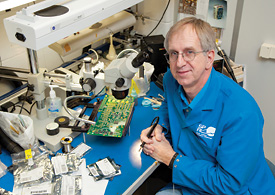Whether it’s building radios in his free time or flying a small airplane around the state of Michigan, Dave Boprie’s personal interests have enhanced his career.
An amateur pilot and self-described “radio enthusiast,” Boprie, a senior electronics technician at the Space Physics Research Laboratory on North Campus, uses his skills to build components for space research instruments, often working with NASA.

Photo by Scott C. Soderberg, U-M Photo Services.
His interests in radio, in particular, have served him well in his position with the university. When the Department of Atmospheric, Oceanic and Space Sciences hosted antennae from the Department of Electrical Engineering and Computer Science, EECS 430 GSIs asked Boprie to help set up experiments and work with their students.
Boprie, who has multiple associate’s degrees from Washtenaw Community College and has been building radios since he was 8 years old, says he has learned a lot from students.
“I want to say thanks to all the students who I’ve been privileged to work with,” he says. “They have taught me so much engineering over the years. Some students have come up with new and interesting ways to approach a problem or project.”
Boprie, who is licensed by the FCC, also has built small radios but spends most of this radio time sending and receiving communications, sometimes from across the planet. He’s also a member of the student amateur radio club at U-M —W8UM.
“The challenge of it is to use the least amount of power to communicate with another person,” he says. “(And) there is always the challenge of picking out a weak signal from the other side of the planet and making sense of it.”
Boprie also has been a member of the Michigan Flyers, a club for amateur pilots, for the past 10 years. He flies small powered aircraft, usually twice a month.
“A couple of my relatives are professional pilots, so I’ve always been around airplanes,” he says. “I feel safer in my small airplane than I do in my car or my bicycle.”
With his job at the Space Physics Research Laboratory, Boprie works with a team of engineers and technicians to build hardware components (and occasionally entire instruments) used to study outer space. Often, his laboratory works to build parts for NASA.
Boprie has worked on instruments that have been sent to study Mars and Saturn, and sometimes the satellites for which he builds parts are ground-based or high-altitude balloons.
He has traveled to Antarctica to support a NASA/U-M balloon project, and also served in the Air Force, where he was stationed in Grand Forks, N.D.
“After three polar trips, the coldest place I ever lived was North Dakota,” he says.
That might come as a surprise, considering he once spent the night in an igloo in Antarctica. One of his missions there was to prepare in case an airplane made an emergency landing over the continent, and he went through a survival school to learn relevant skills, including how to build an igloo.
Boprie also has an interest in protecting the Earth as much as possible. A graduate of nearby Willow Run High School, he lives in Ypsilanti with his wife, Martha, who works in the Division of Nephrology at the university. She has encouraged her husband to ride his bicycle whenever possible.
“We try to be good stewards of our natural resources,” he says, adding his family is the only one in the neighborhood that uses a push-reel mower to cut the lawn.
The weekly Spotlight features faculty and staff members at the university. To nominate a candidate, please contact the Record staff at [email protected].

